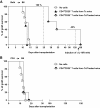Antigen-specific dependence of Tr1-cell therapy in preclinical models of islet transplant
- PMID: 19934002
- PMCID: PMC2809952
- DOI: 10.2337/db09-1168
Antigen-specific dependence of Tr1-cell therapy in preclinical models of islet transplant
Abstract
Objective: In type 1 diabetes, allogeneic pancreatic islet transplant restores insulin production, but life-threatening immunosuppression is required to avoid graft rejection. Induction of antigen (Ag)-specific tolerance by cell therapy with regulatory T-cells (Tregs) represents an attractive alternative approach but its therapeutic efficacy in islet transplant remains to be determined. Among the different subsets of CD4(+) Tregs, the T inducible regulatory type 1 (Tr1) cells can be generated from naive T-cells in the presence of interleukin-10 (IL-10) and represent one promising therapeutic choice. This study was designed to define the efficacy of Tr1-cell therapy in preclinical models of islet transplant.
Research design and methods: Non-Ag-specific polyclonal Tr1 cells and donor Ag-specific Tr1 cells were transferred, in the absence of any pharmacological treatment, in two distinct mouse models of islet transplant. The two models differed in their therapeutic stringency, based on the mean rejection time of untreated mice that underwent a transplant.
Results: Transfer of polyclonal Tr1 cells engendered graft tolerance only in the nonstringent mouse model. Conversely, cell therapy with Ag-specific Tr1 cells induced an IL-10-dependent tolerance in the stringent mouse model of islet transplant. The therapeutic advantage of Ag-specific Tr1 cells over polyclonal Tr1 cells was due to their donor Ag specificity.
Conclusions: These results demonstrate that Tr1-cell therapy leads to tolerance in settings of islet transplant and that its therapeutic efficacy is highly dependent on the antigen specificity of these cells.
Figures



References
-
- Shapiro AM, Lakey JR, Ryan EA, Korbutt GS, Toth E, Warnock GL, Kneteman NM, Rajotte RV: Islet transplantation in seven patients with type 1 diabetes mellitus using a glucocorticoid-free immunosuppressive regimen. N Engl J Med 2000;343:230–238 - PubMed
-
- Shapiro AM, Ricordi C, Hering BJ, Auchincloss H, Lindblad R, Robertson RP, Secchi A, Brendel MD, Berney T, Brennan DC, Cagliero E, Alejandro R, Ryan EA, DiMercurio B, Morel P, Polonsky KS, Reems JA, Bretzel RG, Bertuzzi F, Froud T, Kandaswamy R, Sutherland DE, Eisenbarth G, Segal M, Preiksaitis J, Korbutt GS, Barton FB, Viviano L, Seyfert-Margolis V, Bluestone J, Lakey JR: International trial of the Edmonton protocol for islet transplantation. N Engl J Med 2006;355:1318–1330 - PubMed
-
- Gagliani N, Ferraro A, Roncarolo MG, Battaglia M: Autoimmune diabetic patients undergoing allogeneic islet transplantation: are we ready for a regulatory T-cell therapy? Immunol Lett 2009;127:1–7 - PubMed
-
- Roncarolo MG, Battaglia M: Regulatory T-cell immunotherapy for tolerance to self antigens and alloantigens in humans. Nat Rev Immunol 2007;7:585–598 - PubMed
-
- Sakaguchi S, Yamaguchi T, Nomura T, Ono M: Regulatory T cells and immune tolerance. Cell 2008;133:775–787 - PubMed
Publication types
MeSH terms
Substances
Grants and funding
LinkOut - more resources
Full Text Sources
Medical
Research Materials

